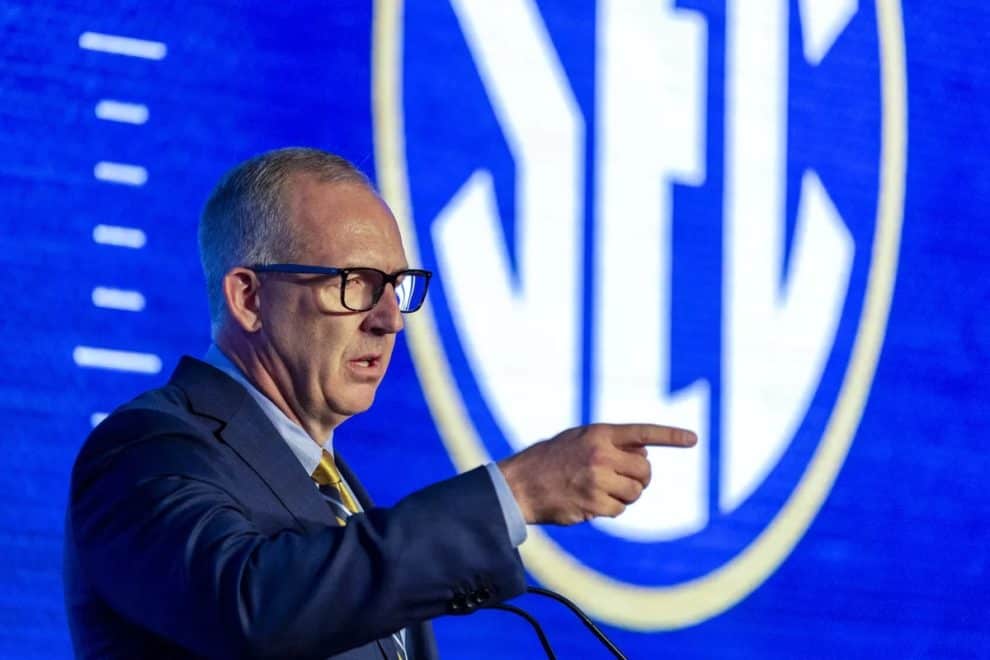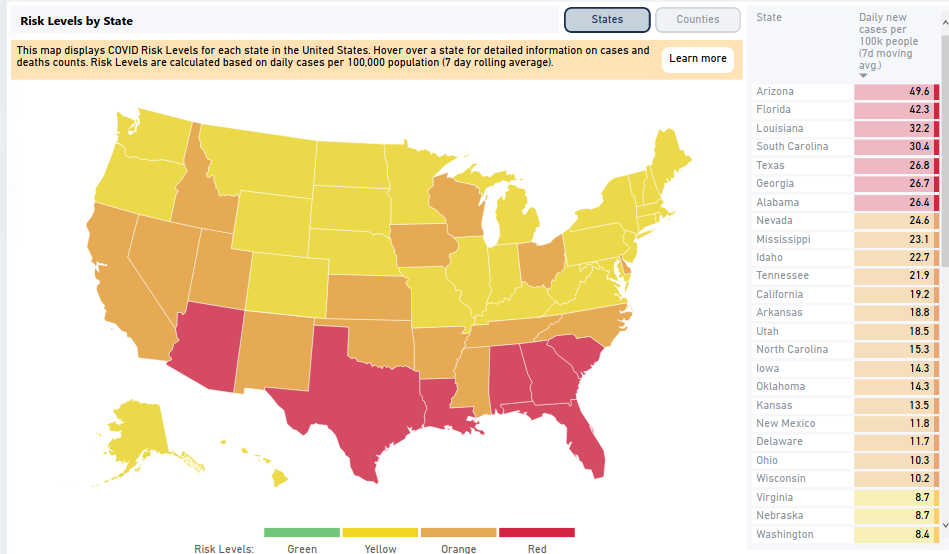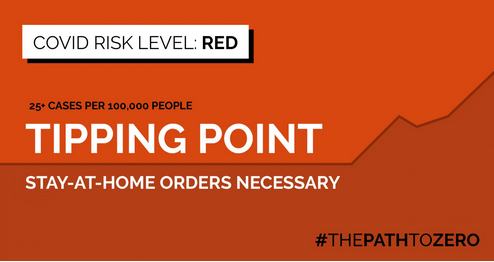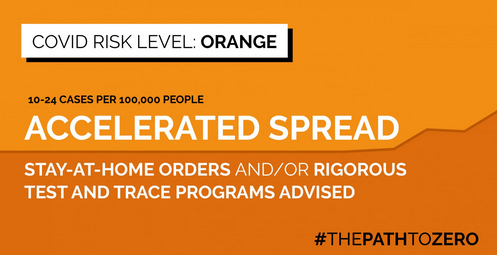
- SEC Commissioner Greg Sankey is not optimistic about college football this fall..
- The Big Ten and Pac-12 have announced that they will play a ‘conference only’ schedule in 2020.
- The SEC has said they’d make a decision on their schedule by late July.
SEC Commissioner Greg Sankey is not optimistic about the 2020 college football season saying that ‘we are running out of time to correct and get things right’. Sankey was interviewed on ESPN Radio earlier today and minced no words about the state of coronavirus mitigation efforts, where the SEC stands on playing football this fall and that factors that are being considered. The sum total of his remarks–his concern for the college football season is ‘high to very high’.
While the COVID-19 situation has improved in some parts of the United States things have only deteriorated in the Southeast. Based on metrics compiled by the Harvard Global Health Institute concerning the severity of the pandemic six of the seven states with the highest level of risk are in the Southeast (I’m including Texas here):

The primary metric here is the moving 7 day average of daily new cases per 100k people. The situation isn’t bad in Missouri (7.8 daily new cases per 100k) and Kentucky (6.9 daily new cases) but everywhere else in SEC country it doesn’t look good. Arizona is at the top of the ‘risk’ list followed by Florida (42.3), Louisiana (32.2), South Carolina (30.4), Texas (26.8), Georgia (26.7) and Alabama. These are the only states in what the site considered ‘RISK LEVEL: RED’ where they assert that ‘Stay at Home Orders Necessary’.

There are a number of states with SEC schools in the second ‘COVID RISK LEVEL: ORANGE’ tier including Mississippi (23.1), Tennessee (21.9) and Arkansas (18.8). The ‘Orange’ risk level means the state is suffering ‘accelerated spread’ with ‘stay at home orders and/or rigorous test and trace programs advised’.

Not exactly the best environment for college football. The biggest point of failure in the United States has been an inconsistent approach to testing and a nonexistent contact tracing program. SEC Commissioner Sankey blasted the way that mitigation tactics such as social distancing and face masks have been ‘politicized’:
“We put a medical advisory group together in early April with the question, ‘What do we have to do to get back to activity?’ and they’ve been a big part of the conversation. But the direct reality is not good and the notion that we’ve politicized medical guidance of distancing, and breathing masks, and hand sanitization, ventilation of being outside, being careful where you are in buildings. There’s some very clear advice about — you can’t mitigate and eliminate every risk, but how do you minimize the risk? … We are running out of time to correct and get things right, and as a society we owe it to each other to be as healthy as we can be.”
Case in point–South Carolina where Governor Henry McMaster has no problem restricting alcohol sales in restaurant and bars but refuses to issue a statewide mask mandate:
“This is an order that a state can enforce. Other things like masks … the state has a very difficult (time) trying to enforce a statewide mask order because one size does not fit all.”
There are 20 states that do have mask mandates including a number with significantly larger populations than South Carolina including California, New York and New Jersey. Only one state with a mandatory mask requirement is home to an SEC school (Kentucky). Furthermore, none of the states with the highest levels of risk require it:
The list of states with mask mandates includes California, Connecticut, Delaware, Illinois, Kansas, Kentucky, Maine, Maryland, Massachusetts, Michigan, Nevada, New York, New Jersey, New Mexico, North Carolina, Oregon, Pennsylvania, Rhode Island, Virginia, Washington and West Virginia.
Sankey conceded that the situation changes by the day and things are different from state to state. For that reason, he isn’t weighing the decision of the Pac-12 or Big Ten to go ‘conference only’ too heavily:
“That literally is playing out in front of us every day. That’s why I don’t feel any pressure because of somebody else’s decisions. We’re trying to make the right decisions for us, for the Southeastern Conference. It does have an impact because I’ve said publicly we’re all linked nationally, so when other people make decisions, yup, there’s an impact, but also we’re going to look at our situation and make a decision that’s appropriate for the Southeastern Conference and most importantly for the health of our student-athletes.”
Ultimately, he says that he’s hoping for the best but preparing for the worst:
“What I’ve tried to do is both keep a focus on what’s ahead but provide reality, which has been I’m going to focus on preparing to play the season as scheduled but acknowledge the circumstances around coronavirus are going to guide us in that decision-making. And the reality right now is the trends in our region, in our nation, are not in the positive direction for being able to have normal experiences.”
There might be more clarity this week. Multiple reports indicate that all 14 SEC athletic directors are planning to meet Monday in Birmingham, Alabama.
UPDATE: Louisiana Governor John Edwards announced a statewide mask mandate on Saturday afternoon.









